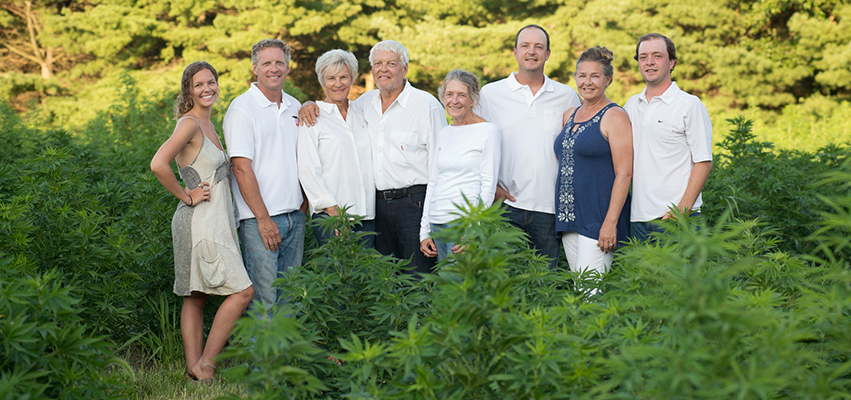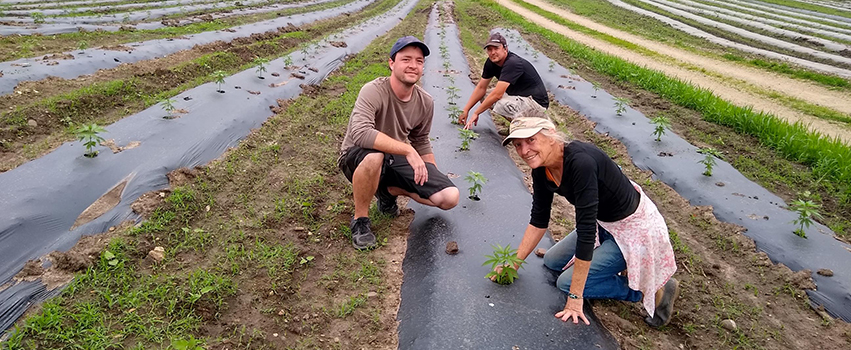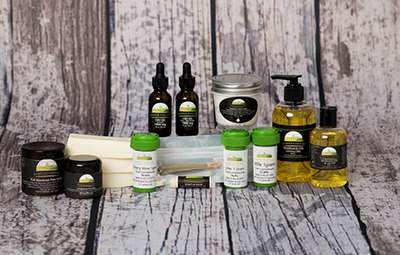
CBD products have flooded the marketplace lately as consumers seek natural alternatives to pharmaceuticals to help them cope with anxiety, depression, chronic pain and other maladies. But in this rapidly growing and unregulated industry, misinformation abounds. It’s a “buyer beware” marketplace, and there are no guarantees the product you’re buying will actually provide the benefits it promises, while the origin of its contents is often unknown.
A new business in Banner, Illinois, hopes to not only capitalize on the market’s potential, but educate people to lessen the confusion. “The consumer needs to understand how to use CBD and how it works in the body,” explains Paul ImOberstag, president of Banner Harvest. “We are a family-owned business that makes all of our products in-house from raw ingredients, and we process and package everything right here in Banner. We’re delivering a farm-to-table experience.”
A Trusted Source
Banner Harvest operates on the property of ImOberstag’s uncle, former Peoria mayor and businessman Bud Grieves. He and his wife Alice live on the 400 acres they purchased in Banner in 1998. “I wanted to convert the property into a conservation showpiece… to demonstrate sustainability and unique water management capabilities,” Grieves explains. “It’s roughly equal acres of native hardwood trees, prairie grasses and restored wetlands.”
While he initially had no plans to farm the property, Grieves recognized an untapped opportunity with this new venture. “I had 10 acres of virgin ground that had no chemicals applied for over 20 years, and I had the machinery and barns to plant, harvest and store product,” he explains. With the addition of his nephew and other family members, he had the combined skillset needed to make it happen.
Eight years ago, when Paul and his wife Yolanda moved to Colorado, they immersed themselves in the cannabis and medical marijuana industry. Paul eventually became director of cultivation for one of the state’s top commercial cannabis growers, while Yolanda learned the merchandising and retail side. Paul’s brother, Luke, soon joined them and learned the ropes as well.
They all moved to Banner in early 2019, along with their mother (Grieves’ sister) and started Banner Harvest, producing CBD products from the hemp they’re growing on Grieves’ land. There are only five of them, working full time between the farm, store and wholesale marketing. “We have not done things the easy way, but we are doing our best to do them the right way,” Paul explains. “It is our name and integrity that sets us apart.”

A New Cash Crop
Many farmers who have traditionally grown corn and soybeans are now growing hemp—and betting their livelihoods on it. Following passage of the 2018 Farm Bill legalizing hemp production, the amount of hemp grown in the United States increased from 78,000 acres in 2018 to an estimated 550,000 acres in 2019. Like corn and soybeans, hemp is a commodity subject to ever-changing market fluctuations. “Many farmers grew hemp for CBD this year, with no guaranteed market or processor to buy the crop,” Paul notes. “[It] has the potential to be a cash crop, but is high-risk until the market matures over the next few years.”
Growing hemp for CBD presents a different set of challenges than other agricultural crops. The objective is to grow female plants to be harvested for the highest CBD content, while keeping levels of THC (the primary psychoactive compound in marijuana) lower than 0.3 percent—the legal threshold separating hemp from marijuana. (Both hemp and marijuana are derived from the cannabis plant.)
“It’s such a young and evolving industry,” Paul explains, “so often farmers must procure seeds or cuttings from unreliable sources without guarantees of what the plant will actually produce in terms of CBD content—or if the plant will be too high in THC.” During the growing season, no chemical herbicides, insecticides or fungicides are allowed, so maintaining the crops is very labor-intensive. Most varieties are ready for harvest in 120 days.
This past season, however, was especially challenging due to the extreme weather, including flooding in the spring, drought conditions in the summer, and damaging storms in the fall. “We were not able to get our seedlings in the ground until almost mid-June, and had to skip large sections of the field because it was just too wet,” Paul says. “Then we were hit with a 70-mph wind shear from a late September storm which knocked over or damaged more than 2,500 plants.”

Buyer Beware
Besides being at the mercy of the weather, the ImOberstags must also contend with unreliable competitors amidst uncharted and shifting legal territory. “It is the ‘wild, wild west,’” Paul notes. “[Some] people are just in this to get rich quick, and they don’t care or even know anything about CBD, except how to market it in large volumes.”
“The market is saturated with CBD oil—every strength and flavor you can think of, and at price points from $20 to $300 a bottle,” Yolanda adds. “It is scary.” Some companies get away with selling large quantities of products to other brands, which then label the products as their own without really knowing what they’re buying. That’s why documentation from an accredited laboratory—showing the amount of various cannabinoids (which include THC and CBD) in the product—is so important. But even in these cases, consumers must pay close attention.
“Once a company gets a good certificate of analysis (COA) from a lab for one product, they then market that on every product they produce, which is completely misleading,” Yolanda explains, advising that consumers always check the COA before purchasing CBD products. At Banner Harvest, samples of all product batches are sent to a lab for testing and certification, ensuring their quality and setting the business apart from their unscrupulous counterparts.
Cannabis As Medicine
Most consumers of CBD products are looking for natural alternatives to pharmaceuticals. “They want to feel better, get pain relief and manage stress without the dangerous and addictive options offered through prescription drugs,” Yolanda notes. “They are looking for the best answers we can give them about CBD. We are passionate about cannabis as a medicine, and although we can’t make any claims of benefits, there is plenty of testimonial evidence that CBD is helping with a wide array of issues.”
Banner Harvest currently sells a line of CBD oils, body butter, lip balm, salves, gummies and bath bombs at its store in Banner, on its website and at various outlets in the Peoria area. “I think the CBD business, which is growing exponentially… will eventually shake out to trusted suppliers who strive for consistency and quality,” Grieves says. “Controlling the entire process from seed to final sale—and being local—gives us a competitive edge.” PM
For more information, visit bannerharvest.com.
- Log in to post comments

